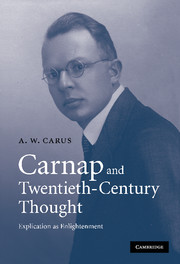Book contents
- Frontmatter
- Contents
- Preface
- Note on the style of citation
- Introduction
- 1 The cultural inheritance
- 2 The intellectual inheritance: positivism and Kantianism
- 3 The grand plan of a ‘system of knowledge’: science and logic
- 4 Carnap's early neo-Kantianism
- 5 The impact of Russell
- 6 Rational reconstruction
- 7 The impact of Wittgenstein
- 8 The crisis of rational reconstruction, 1929–1930
- 9 Liberation
- 10 Tolerance
- 11 The ideal of explication
- Bibliography
- Index
5 - The impact of Russell
Published online by Cambridge University Press: 22 September 2009
- Frontmatter
- Contents
- Preface
- Note on the style of citation
- Introduction
- 1 The cultural inheritance
- 2 The intellectual inheritance: positivism and Kantianism
- 3 The grand plan of a ‘system of knowledge’: science and logic
- 4 Carnap's early neo-Kantianism
- 5 The impact of Russell
- 6 Rational reconstruction
- 7 The impact of Wittgenstein
- 8 The crisis of rational reconstruction, 1929–1930
- 9 Liberation
- 10 Tolerance
- 11 The ideal of explication
- Bibliography
- Index
Summary
TOWARD A ‘TOTAL SYSTEM OF ALL CONCEPTS’
Though Carnap had many different irons in the fire in the period before 1922, his main preoccupation was the development of a comprehensive system of knowledge: ‘I worked on many special problems, always looking for new approaches and improved solutions. But in the background there was always the ultimate aim of the total system of all concepts. I believed that it should be possible, in principle, to give a logical reconstruction of the total system of the world as we know it’ (UCLA 1957a, p. E4). We can trace the evolution of this idea, already visibly headed in the direction of the Aufbau, in several sets of notes from this period. Even in the earliest of these notes, dated August 1920 and headed ‘Skeleton of Epistemology [Skelett der Erkenntnistheorie]’, Carnap implicitly rejects both the Marburg and the phenomenological responses to Helmholtz's empirical investigation of perception:
The first given: experiences (facts of consciousness) … In some cases I can observe, rather than the experience itself, a particular aspect of the experience: its ‘object’. (So not ‘intentional relation’); these experiences we call ‘ideas [Vorstellungen]’. Some ideas are particularly singled out (give the criterion!): ‘sensations [Empfindungen]’.
(ASP 1920c)A few months later, in April 1921, he put down some further notes entitled ‘Analysis of the World Picture [Analyse des Weltbildes]’.
- Type
- Chapter
- Information
- Carnap and Twentieth-Century ThoughtExplication as Enlightenment, pp. 139 - 160Publisher: Cambridge University PressPrint publication year: 2007



